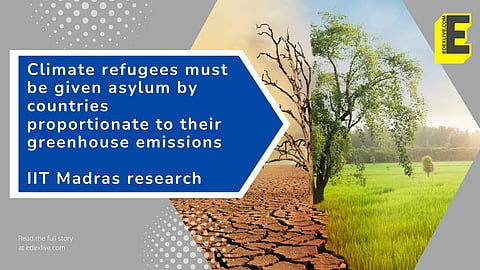

Climate change-induced migration is a pressing concern impacting thousands of communities worldwide. The Indian Institute of Technology (IIT Madras) has now urged nations to leave their doors open for asylum seekers suffering due to climate change.
The researchers have termed this the principle of "non-refoulment" and have accordingly urged countries to absorb those refugees who flee the impact of climate change. How does this policy work?
Essentially, the researchers suggest that asylum-seekers from vulnerable zones be absorbed into countries in proportion to the latter's greenhouse emissions. The research paper is titled, ‘Cross border migration on a warming planet: A policy framework' and was authored by Prof Sudhir C Rajan, Department of Humanities and Social Sciences, IIT Madras and Dr Sujatha Byravan, an independent scholar.
Reflecting on the need for equity in action for those displaced by climate change, Prof Sudhir C Ranjan said, “Climate scientists have known for more than a decade that tens of millions of people, if not more, will be forcibly displaced from some of the poorest countries as a result of climate change. If their countries are no longer viable homes through no fault of their own, the international community has a moral responsibility to provide refuge.”
Citing the example of millions of people living in the coastal areas of densely-populated Bangladesh, Prof Ranjan says, "People living along the coast have been migrating to the Bangladeshi capital due to monsoon flooding and cyclones caused by rising sea levels. For these residents, the worsening climate change is not a faraway threat. It is a grim reality.”
It came to light that out of the 40.5 million people displaced in 2020, almost 30 million people were forced to flee their homes due to climate change. These numbers were reported by Internal Displacement Monitoring Centre. The study observed that there was a lack of a comprehensive international plan or framework to deal with the concerns of those exiled from their homes due to climate change and, more importantly, to protect their rights.
Elaborating on the need for an internationally recognised framework to rehabilitate climate refugees, Dr Sujatha Byravan adds, "Climate exiles or migrants have no legal standing. These are the kinds of issues that ought to be addressed in the climate negotiations track of Loss and Damage under non-economic losses.”
The researchers do address concerns that identifying a climate refugee might be a hard task. However, the time spent on this identifying exercise might amount to crucial time lost in rehabilitating the victims of climate change. As a counter to this, the study proposes two approaches to address the concerns of any potential climate refugee. These are classified as strong and mild approaches.
Under the strong approach, countries must treat all asylum seekers as worthy of refuge as under the non-refoulment policy. Asylum should be ensured by host countries who need to come together to formulate a protocol in order to distribute climate refugees amongst themselves as per their respective greenhouse emissions.
The mild approach on the other hand works with communities and areas endangered by climate change on the basis of scientific evidence. These include low-lying states, countries with low-lying delta regions, areas facing desertification or flooding and hill slopes subject to erosion. These communities must be identified and granted the right to seek free asylum from other countries based on a fair agreement set around the hosts' greenhouse emissions, said the study, that was published in the peer-reviewed journal, WIRES Climate Change.
